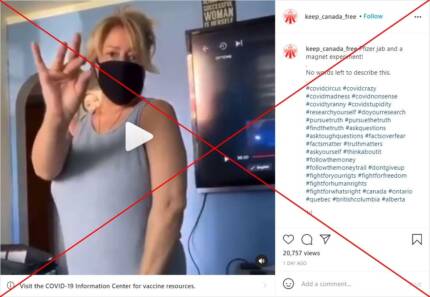Vaccines for COVID-19 do not contain metals or microchips that make recipients magnetic at the site of injection. Physics and medical experts have clarified now.
[adinserter block= “3”]
The flawed claim was made in a series of viral videos claiming to show magnets attracted to the arms of alleged jab recipients. Several clips said the supposed phenomenon was proof that people were microchipped. Meanwhile, others provided no explanation for the “magnet challenge”. Only one video named a specific vaccine, claiming the individual on camera had received the Pfizer/BioNTech shot.
However, these posts are not evidence of a magnetic reaction nor that COVID-19 jabs contain a microchip.
Baseless conspiracies & COVID vaccines
Firstly, Reuters has debunked baseless conspiracies about microchips in coronavirus vaccines throughout the pandemic. These conspiracies often targeted the Microsoft co-founder and philanthropist Bill Gates. They suggested that Gates started coronavirus to control humans via microchips.
Secondly, none of the COVID-19 jabs approved in the United Kingdom or the United States contain metallic ingredients. Many other shots do have small amounts of aluminum. However, Oxford University researchers say this is no more harmful than the minimal quantities found naturally in almost all foods and drinking water.
[adinserter block= “10”]
Thirdly, even if COVID-19 vaccines did contain metals, they would not cause a magnetic reaction. Medical professionals at the Meedan Health Desk said, “The amount of metal that would need to be in a vaccine for it to attract a magnet is much more substantial than the amounts that could be present in a vaccine’s small dose.”
They added that humans are all naturally “a little bit magnetic” because we contain tiny quantities of iron. However, the combination of iron and water in the body repels magnets very slightly. This function is the basis of Magnetic Resonance Imaging (MRI) scans that allow doctors to assess your organs in hospitals.

Professor Michael Coey from the School of Physics at Trinity College Dublin also described the claims as “complete nonsense”. Coey said one needs about 1gm of iron metal to attract and support a magnet at the injection side; something you would “easily feel” if it was there.
“By the way, my wife was injected with her second dose of the Pfizer vaccine today. I had mine over two weeks ago. I have checked that magnets are not attracted to our arms!”, he wrote.
Responding to a “magnet challenge” video featuring Pfizer jab, a spokeswoman confirmed their vaccine does not contain any metals. Their vaccine cannot cause a magnetic response when it is injected.
[adinserter block= “4”]
Verdict? False. Experts say vaccinated individuals cannot not experience magnetism at the injection site.
What do you think of this story? Let us know in the comments section below.







